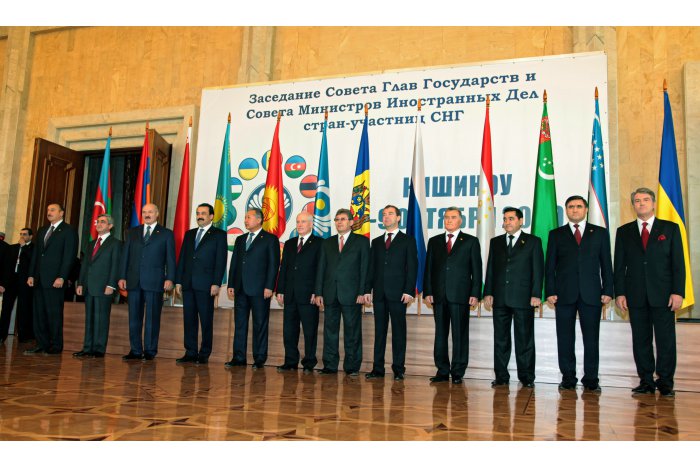8 October 2009: Summit of Commonwealth of Independent States takes place in Chisinau
13:25 | 08.10.2021 Category:
The comfortable installation in power of the Alliance for European Integration in 2009 generated hopes that the great mistake made by Mircea Snegur in 1991 and the Agrarian Democratic Party in 1994, when the choice was made for Eastern integration, ie cessionist, will be repaired and the Republic of Moldova it will orient decisively and irreversibly towards the West. The statements of the politicians in Chisinau also resonated with the name of the alliance.
However, the alliance, made up of parties with different visions of relations with Russia, had to be kept in order to start reforms and, it is no secret, to receive money from the European Union.
Several politicians invoked the principle of pragmatism that will allow us to benefit from good economic relations with both the East and the West. The agrarian theory with the gentle calf breastfed by two cows has been raised to the rank of state policy. Here is how the deputy of the Democratic Party, a member of the governmental arc, Andreea Popov, explained the essence of this “pragmatism”: “We benefit from a free trade area within the CIS and from a regime of autonomous trade preferences with the EU. Even Romania, at the level of businessmen, envies the regime enjoyed by the Republic of Moldova. The relations of the Republic of Moldova with the EU are more advanced than the relations of Georgia (which abandoned the CIS - n.n.). There is a rule within the union: the EU is much more flexible and receptive to assisting candidate or EU member states that are in a collegial and non-conflicting relationship with Russia. When a small state has bad, conflicting relations with the Russian Federation, EU states are more reluctant to help it, because they fear that this will affect their relations with the Russian Federation. " Total false. One means "non-conflicting relationships" and the other is the CIS membership with all its implications. When the Republic of Moldova became an associate member of the EU and continued with the supposedly good relations with the CIS, important dignitaries of the European Commission warned us that there are some red lines and the European standards are incompatible with the existing ones. And the Russians later said that Chisinau will no longer benefit from the preferential regime of economic relations within the CIS, as it integrates its economy into the European Union.
This "gentle calf" argument was the spearhead of President Snegur's speech on 4 August 1993, when he urged members of the first parliament to ratify the CIS membership. The settlement of the Transnistrian conflict and the excellent economic relations with Russia, this is what the Republic of Moldova should have received on the tray in the vision of the agro-communists. The first parliament voted against, even though it led to its dissolution.
The agro-communist revenge of 1994 paved the way for the ratification of the accession to the CIS even in the first days of activity of the new parliament. Expectations turned out to be in vain. The Transnistrian problem has not only not been solved, on the contrary. Tiraspol, supported economically, politically and militarily by Russia, created a state appearance with proper documents and held several referendums on union with the Russian Federation.
And yet, the CIS summit in Chisinau took place and was chaired by Moscow's toughest critic, Mihai Ghimpu, who was acting as parliamentary speaker and interim head of state.
As a rule, CIS meetings are more formal, decisions are often not enforced, and the decision on mutual payments between CIS countries in Russian rubles devalued the national currencies of member countries on a Tuesday in 1998 in a catastrophic way.
The summit in Chisinau was anemic, without an impressive history, and for us only a sliver of the speech of Moldovan Foreign Minister Iurie Leanca remained in our memory, who had the courage to declare that European integration is a priority for the Republic of Moldova. The Russian Federation delegation did not react negatively, but Moscow's true attitudes are being prepared and declared elsewhere than in this metaphorical organization, which the great political analyst Zbigniew Brezezinski called "Adam's greatest leaf in the world." .
The CIS executive body, led by Russia's representative Sergei Lebedev, also said it respects Moldova's pro-European option and is pleased that "there is support for the development of cooperation relations with CIS countries." The Russian diplomat added that "this approach of the Moldovan authorities is a pragmatic one". Russia's true attitude towards Moldova's integration into the EU was visible later.
In addition to an agenda with a lot of purely technical issues, state leaders had the opportunity to benefit from bilateral meetings that were much more useful than the decorative summit. Both Mihai Ghimpu from his double position and Prime Minister Vlad Filat had several meetings, including with the presidents of the Russian Federation, Kazakhstan,Turkmenistan, Uzbekistan, Ukraine, Belarus and Tajikistan.
The summit of October 9, 2009 demonstrated that the political class in Chisinau took the exam of maturity and pragmatism.

